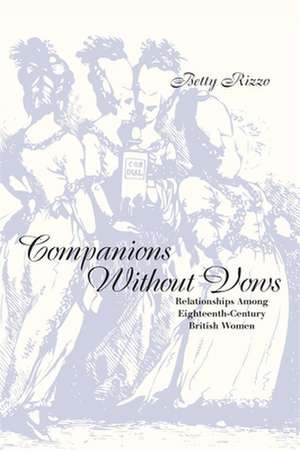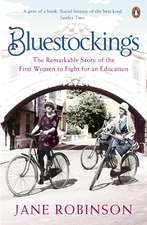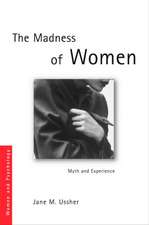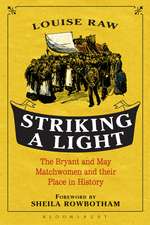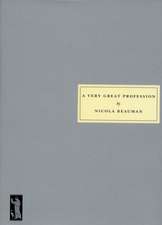Companions Without Vows: Relationships Among Eighteenth-Century British Women
Autor Betty Rizzoen Limba Engleză Paperback – 31 aug 2008
Preț: 273.08 lei
Nou
Puncte Express: 410
Preț estimativ în valută:
52.27€ • 53.86$ • 44.13£
52.27€ • 53.86$ • 44.13£
Carte tipărită la comandă
Livrare economică 04-18 martie
Preluare comenzi: 021 569.72.76
Specificații
ISBN-13: 9780820332185
ISBN-10: 0820332186
Pagini: 472
Dimensiuni: 156 x 234 x 24 mm
Greutate: 0.65 kg
Editura: University of Georgia Press
ISBN-10: 0820332186
Pagini: 472
Dimensiuni: 156 x 234 x 24 mm
Greutate: 0.65 kg
Editura: University of Georgia Press
Textul de pe ultima copertă
Companions Without Vows is the first detailed study of the companionate relationship among women in eighteenth-century England - a type of relationship so prevalent that it was nearly institutionalized. Drawing extensively upon primary documents and fictional narratives, Betty Rizzo describes the socioeconomic conditions that forced women to take on or to become companions and examines a number of actual companionate relationships. As Rizzo points out, several factors fostered such relationships. Husbands and wives of the period lived largely separate social lives, yet decorum prohibited genteel women from attending engagements unaccompanied. Also, women of position needed - or insisted on having - social consultants and confidantes. Filling this need were many well-born young women without sufficient funds to live independently. Because family money and property were concentrated in the hands of eldest sons, few unattached daughters could afford to live in comfort on their own. As a result, they frequently had to seek the protection of female benefactors for whom they performed unpaid, nonmenial tasks, such as providing a hand at cards or simply offering pleasant company. The companionate relationship between women could assume many forms, Rizzo notes. it was often analogous to marriage, with one partner in command and the other in subservient attendance. Some women - particularly in the second half of the century - experimented with more altruistic models, establishing partnerships that were truly egalitarian. Rizzo explores these various types of relationships both in real life and in fiction, noting that much of the period's discourse about women's relationships can be seen as atacit commentary on marriage. Many women writers, she contends, consistently portrayed the moral corruption that tainted companions as well as their superiors. Although few of these writers called openly for an end to gender inequality, Frances Burney, Sarah Fielding, Sarah Scott, Charlotte Smith, and others effectively subverted prevailing ideology by quietly experimenting with alternative models. The most notable of these efforts, says Rizzo, was the work of the Bath community of women, the ideas of which helped to produce both Sarah Scott's novel The History of Millenium Hall and a short-lived utopian experiment.
Notă biografică
BETTY RIZZO is a professor emerita of English at the City College of New York. She is the coauthor of Christopher Smart: An Annotated Bibliography, 1743-1983, and coeditor of The Annotated Letters of Christopher Smart.
